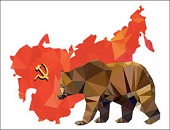What’s with Russia and cyber-hacking? How did it happen, and why? Geopolitical risk threatens the very fundamentals of market stability and the world order. The Global Association of Risk Professionals treated its members to a “big picture” risk topic during the webinar on November 1, 2017.
Former senior US intelligence officer Jack Thomas Tomarchio, who is now a principal with the Agoge Group, LLC, described the current geopolitical risk due to Russian cyber-attacks. “Russia was declared to be responsible for leaks at the Democratic National Convention in 2016,” Tomarchio said. “The DNC is supposed to be neutral, but the leaks showed a definite anti-Bernie Sanders bias.”
There was also Russian interference in the voting in 24 to 36 states, Tomarchio said. Two cyber companies, FireEye and Crowdstrike, identified interference as early as May-June 2016 when they described advanced persistent threats (APT) called “cozy bear” (APT 29) and “fancy bear” (APT 28). “These two were in the cyber knickers of the US electoral process,” he said.
Hackers connected with the Russian Secret Police (FSB) and Russian Military Intelligence (GRU) have been affecting a long list of US national institutions, including banks and hospitals and research institutions. These hackers have hit other nations such as Brazil, Malaysia, and many countries in the western European Union. “Fancy bear, run by GRU, has been persistent since 2007,” Tomarchio said. In the midst of the code was found a message claiming to be from the long-dead Felix Dzerzhinsky— founder of the Russian secret police. “It was intended as a message to the West,” Tomarchio said. “Meaning [the cyber-attackers] can come interfere anywhere, at any time.”
Why would Russia do this? A large “efficient and brutal” apparatus of Russian state secrets has existed since the days of the tsars. Many Russians work for the Russian Business Network (RBN), a thinly disguised form of the Russian mafia. “Highly sophisticated, well-educated people use their skillsets to go into crime,” Tomarchio said. The understanding is that the government allows them to continue their nefarious deals, whatever they may be, but from time to time, they must help with some state-sponsored espionage.
“Russia views the cyber domain as an asymmetric place to do battle,” he said. He cited the Russo-Georgian war of 2008, when cyber-attacks were used to take down the Georgian military. “They could not communicate so they could not win the struggle.” The war lasted five days.
Another example was the 2007 conflict over a statue in Tallinn, Estonia. Russian sympathizers took down the military, government, and banking systems to further Russian strategic objectives. Tomarchio said, “They use cyber-attacks as a cheap way to project power around the world.”
But why does Russia care so much about projecting power around the world?
Tomarchio summarized the reign of Ivan the Terrible, who built Moscow into the beginning of the modern state of Russia. Tomarchio emphasized the huge size of Russia, which spans 11 time zones. It has been plagued by poor infrastructure, poverty, illiteracy, and government corruption. “Despite these problems, Russia grew from 1584 to 1940 at an average rate of 50 square miles a day every year in that time period,” he said.
A drawback is the lack of natural boundaries, making Russia vulnerable to invasion. Russia surrounded itself with 14 Soviet socialist republics, which helped buffer the Russian homeland, the Rodina, from invasion. When the Soviet Union ended in 1989, the Russian homeland “felt naked without its buffer states.” Not only did Russia lose the Baltic states from the Warsaw pact—they went and joined NATO.
Tomarchio reminded the audience of a time when multiple states ceded from the USA; it launched the US Civil War. “We didn’t like it either.”
“Vladimir Putin regards the fall of the USSR as the greatest disaster of the twentieth century,” said Tomarchio. “Russia will be run by Vladimir Putin for the foreseeable future, but he has a populace that wants a better life. At the moment he limits dissent, kills the critics, and distracts the populace.” However, when Putin sees an opportunity to win territory or prestige, he will seize it.
This happened with the 2014 annexation of Crimea by the Russian Federation while the US was preoccupied with the civil war in Iraq. Tomarchio said this is why Russia is propping up the regime of Bashar al-Assad in Syria: “Russia continues to assert itself” as a player in world affairs.
Putin did not want Hilary Clinton to win the US presidential election, because she had urged Russian citizens to depose their leader. “I think he wanted to work with a political novice like Trump,” Tomarchio speculated.
“The future of US and Russia relations is dim,” he said. “We are in for a long haul of pretty tough times. “Wherever they can get in a cheap shot, they will,” he said, flipping to a picture of the Admiral Kuznetsov Carrier.
For this reason, US institutions and firms should be prepared for continued cyber-attacks, and continued meddling such as fake news and social media manipulation. ª
Click here to view the GARP Webcast- Geopolitical Risk: Politics, Hacking and the New Russia http://bit.ly/2xdQW3S
The teddy bear graphics are from nounproject.com.
The bear and Russia graphic is from Crowdstrike.com.



